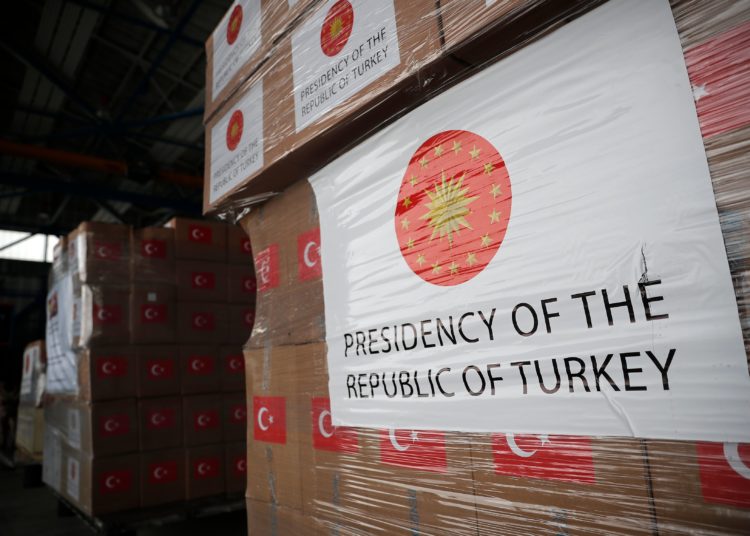Nordic Monitor
In a bid to win friends and allies abroad, the increasingly isolated government of President Recep Tayyip Erdoğan in Turkey has sent medical supplies to several countries at a time when its own population needs testing and healthcare institutions are demanding medical equipment for use against the coronavirus pandemic.
The move also helped fuel the Erdoğan government’s domestic narrative that Turkey is now in a position help major powers in Europe as well as the US struggling to cope with the global outbreak. But the Erdoğan government’s actions came at the expense of Turkey’s own domestic needs for healthcare professionals and first responders, who are criticizing the government for the lack of urgently needed medical supplies.
Last week Turkish Medical Association (TTB) Chairman Sinan Adıyaman underlined the fact that Turkish healthcare workers were being infected with COVID-19 due to the lack of personal protective equipment. Speaking at a virtual event hosted by the Atlantic Council on April 14, Turkish Foreign Minister Mevlüt Çavuşoğlu interestingly noted that Turkey has sent medical equipment to 34 countries including allies Italy, Spain, the United States and the United Kingdom despite the need for medical equipment in his own country.
Turkey’s medical assistance including protective masks and overalls, on the one hand, is aimed at increasing Turkey’s credibility among EU member states and NATO allies, which was ruined after the government’s attempt to weaponize refugees against Europe. On the other hand, the images of medical air cargo, marked as if it was personal assistance from President Erdoğan’s office, are being used by ruling Justice and Development Party (AKP) officials and the state-controlled media to spin an anti-Western campaign in the country.
In parallel to that medical assistance, President Erdoğan also ordered the Turkish coast guard to prevent migrants and refugees from crossing the Aegean Sea to Greece. Ankara then started to wind down its policy of moving migrants to the Greek land border and began bussing them back to Istanbul. In response, the EU announced that it is procuring small-scale health infrastructure and equipment worth 90 million euros for Turkey under its EU Facility for Refugees in Turkey program.

While Turkey’s fight against the pandemic and its medical assistance operations are praised by the Turkish media in line with the campaign, Erdoğan and his government continue to portray Western countries as handling the virus poorly.
Following Turkey’s provision of medical supplies to Balkan countries transported by Turkish military cargo aircraft, Ömer Çelik, spokesperson for the AKP and former EU affairs minister, accused European leaders of attempting to put an end to Turkey’s growing influence in the Balkans and of not demonstrating solidarity with the Balkan countries amid the COVID-19 crisis. “We have not seen any [cargo] aircraft from powerful European countries flying over Italy, Spain, Serbia, Bosnia and Herzegovina, Montenegro, North Macedonia or Kosovo. [However] Turkey has shown the flag [in those countries] in the name of solidarity,” said Çelik.
At a press conference on Tuesday Çelik also stated that “the legendary European solidarity has been shredded in the face of the virus. Quite inhumane situations have unfortunately emerged. There was talk about NATO solidarity, for example, when Spain appealed to NATO. There as well, nor enough performance is seen. In fact, the only example the NATO secretary-general could present as evidence of solidarity was Turkey’s assistance to Spain, Italy and other countries.”
President Erdoğan repeatedly underlined Turkey’s medical assistance to Western countries and stated that those states had abandoned essential services and left their citizens vulnerable. “The state [Turkey] has taken all the necessary precautions. There is no shortage of any product. We have plenty of medical and other supplies,” Erdoğan said and recalled images of empty shelves in some Western countries.

In line with Erdoğan’s remarks, the anti-Western campaign was fueled by media figures and party officials depicting Europe’s coronavirus fight as a failure by the use of false information and analogies. “Fees for the Covid-19 treatment in [some] countries: the US: 34 thousand dollars; the Netherlands: 28 thousand euros; Spain: 20 thousand euros; France: 20 thousand euros; Israel: 24 thousand dollars; the UK: 30 thousand pounds; Germany: 32 thousand euros; Turkey: paid by the state!” Ali Özkaya, an AKP deputy tweeted on April 14. His tweet was shared on social media by Deputy Foreign Minister Yavuz Selim Kıran.
Özkaya was among Turkish MPs featured in a popular photo taken while they were casting their votes in parliament on January 20, 2015 to clear four ex-ministers of corruption.
Four ministers were forced to resign on December 25, 2013 after the revelation of two corruption investigations on December 17 and 25, in which the inner circle of then-Prime Minister and current President Erdoğan was implicated. Erdoğan dismissed the corruption allegations, sacked the prosecutors and police chiefs and hushed up the graft probes, after which the ministers were cleared of any crime in a parliamentary vote.

According to Daily Sabah, a mouthpiece for the Turkish government, Turkey has provided medical assistance to Azerbaijan, Bosnia and Herzegovina, Bulgaria, China, Colombia, Georgia, Germany, Hungary, Indonesia, Iran, Israel, Italy, Kosovo, Lebanon, Libya, Montenegro, North Macedonia, Pakistan, Palestine, the Philippines, Poland, Qatar, Serbia, Somalia, Spain, Tunisia, the UK, the US, Yemen, the Turkish Cypriots and the Rohingya Muslims since the pandemic began.
The Turkish government also agreed to sell medical supplies, including face masks and sterile gloves, to Israel, though some factions of the ruling AKP define the pandemic as a tool of biological warfare, a selective or smart virus developed by Zionists. On April 9 three Israeli cargo planes landed at a Turkish airbase to take on masks and other protective gear for healthcare workers. In return, Israel will allow Turkey to send a separate shipment of medical equipment to the Palestinian Authority, a high-ranking Turkish official told Bloomberg.












